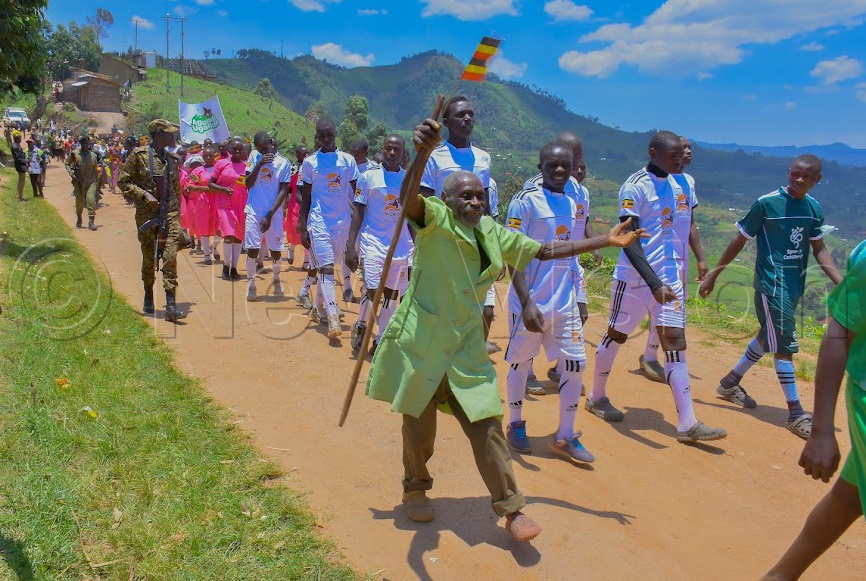Calls to upgrade tourism roads grow as Uganda celebrates Gorilla Day
As Uganda joined the rest of the world to celebrate World Gorilla Day on September 24, there was a call from several domestic and international tourism stakeholders to have the roads tarmacked in order to give visitors a seamless travel experience.
Gorillas that were sighted sauntering in the restored Ishaya wetland outside Bwindi national park in Ruhija sector. (Photo by Julius Luwemba)
________________
Adriana Lanzillo Borja, a tour operator from Mexico, works for a company that specialises in incentive travel with clients in the banking and insurance sectors, among other corporate fields. Her company hosts over 60 events annually.
Adriana visited Uganda early this year to develop an itinerary for her clients. While mesmerised by the natural beauty and endowments that Uganda has, the Mexican tour operator remains hesitant to bring tourists for gorilla tracking due to the bumpy murram roads leading to the Bwindi-Mgahinga conservation area, from which gorillas are observed.
As Uganda joined the rest of the world to celebrate World Gorilla Day on September 24, there was a call from several domestic and international tourism stakeholders to have the roads tarmacked in order to give visitors a seamless travel experience.
"Uganda needs more investment in the hospitality industry and more comparative knowledge of what the countries around you (Uganda) are doing. You also need to invest in the people (locals) because, whereas they're eager to learn, they lack proper direction on where to acquire the knowledge and information from," Adriana advised.
This was echoed by Dr James Musinguzi, the executive director for Uganda Wildlife Authority (UWA), who lauded the Government for some of the infrastructure raised within several protected areas, but appealed for a fast-tracked development of what he termed the gorilla roads.
"We wish to see the construction of Kisoro-Mgahinga road, Kisoro-Rubuguri road and the Kisoro-Rushaga road, among others that feed into Bwindi and Mgahinga national parks," Musinguzi said.
He further stated that gorillas remain the country's premium tourism attraction, contributing approximately 70% of the tourism revenue.
Over 60 telecom masts being set up
Musinguzi, however, revealed that together with the Uganda Communications Commission (UCC) and the telecom companies, UWA is setting up 69 telecom masts in and around several protected areas across the country in order to enhance connectivity and visitor experience.
Gorilla day celebrations
Local communities around Bwindi Impenetrable National Park celebrated World Gorilla Day with a commitment to mountain gorilla conservation through a comprehensive day of environmental activities organised by their umbrella organisation, Change a Life-Bwindi, in partnership with UWA and Uganda Tourism Board (UTB).
Marching for gorilla conservation. (Photo by Julius Luwemba)
The celebrations, held under the theme: Community Responsibility towards Conservation of Mountain Gorillas and Ending Plastic Use, also brought together other stakeholders, including the National Environment Management Authority (NEMA), Max Planck Institute, Ecosia, Kabale University and Kanungu district local government. Members of local communities, including the Batwa, Bakiga, Rwandans and Bafumbira peoples, demonstrated the inclusive nature of conservation efforts in the region.
Christine Katushabe, founder of Change a Life Bwindi, emphasised the importance of local ownership in conservation efforts.
"Protection of African forests should be done by Africans. The future of our forests is in our hands," Katushabe said, adding: For a long time, everything was done by locals, but whites usually take indigenous knowledge without locals benefiting.
The communities demonstrated commitment to environmental conservation and sustainable development through multiple co-ordinated activities across the Ruhija tracking sector in Mpungu sub-county, Kanungu district. The day began with an extensive clean-up where volunteers loaded trucks with plastic waste collected from around Kanungu district, addressing the growing concern of plastic pollution in the area.
The highlight of the conservation efforts was an ambitious tree planting initiative that saw 2,000 indigenous trees planted across the region. The project featured 50 different indigenous tree species and successfully restored 65 acres out of a planned 100-acre conservation area.
"We want to mentor each child so that when they grow up, they appreciate and take on the role of conservation in the communities," Katushabe said.
UTB chief executive officer, Juliana Kagwa, pointed out the importance of gorillas to Uganda's economy, saying the number of tourists visiting gorilla habitats has been increasing post-COVID-19.
"A total of 50,726 tourists visited Bwindi-Mgahinga conservation area last year, higher than 48,568 tourists who visited the same gorilla protected area in 2023 and 38,105 in 2022," she said.
UTB boss underscored the importance of tourism, to which gorillas play a vital role, saying the sector contributed 6.6% to Uganda's GDP and directly supported 803,691 jobs in the last financial year. "With slightly above 1,000 mountain gorillas remaining in the wild, community-driven conservation efforts like those demonstrated in Kanungu district remain essential for the species' survival," Kagwa remarked.
The mountain gorilla population in Bwindi Impenetrable National Park represents more than half of the world's remaining population of gorillas, making community conservation efforts in the region critically important for the species' global survival.